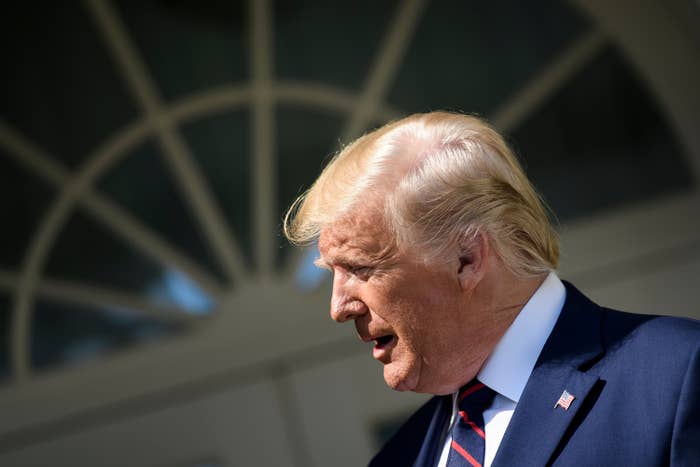
WASHINGTON — The Justice Department notified a federal judge on Wednesday that the Trump administration would "voluntarily agree," for now, not to destroy any records about President Donald Trump's conversations with foreign leaders — avoiding a drawn-out legal fight and a formal ruling that the judge warned one side "might not appreciate."
In a two-page notice, DOJ said that administration officials on Wednesday had "instructed relevant personnel" to preserve six categories of records while a lawsuit over how the White House handles records of Trump's and other senior officials' communications with foreign officials goes forward. The groups originally sued in May, but this week asked the judge to enter an emergency order requiring the administration to preserve documents in light of new information about Trump's conversations with foreign leaders and reports of efforts by the White House to restrict access to those records.
A DOJ lawyer had declined to immediately give that assurance at a court hearing on Tuesday, arguing that the Justice Department had already instructed administration officials to preserve records relevant to the lawsuit, and there was no evidence of any risk of document destruction.
US District Judge Amy Berman Jackson expressed confusion about why the government couldn't take the extra step of confirming it would preserve certain categories of information for now and avoid forcing her to make a swift decision on potentially complex legal questions.
The categories of documents that the administration committed to preserving Wednesday include all records of the president's meetings, calls, and other communications with foreign leaders, documents about the administration's record-keeping practices and policies, and records about any efforts by the White House or other executive branch officials to "claw back" or otherwise limit access to records about officials' communications with foreign leaders.
Jackson on Tuesday had strongly encouraged the Justice Department to consider making a voluntary assurance that the government would preserve documents to maintain the "status quo," as opposed to have the court officially weigh in on the plaintiffs' request for an emergency temporary restraining order.
The lawsuit accuses the Trump administration of violating federal record-keeping laws by failing to create, and properly save, records of Trump's and other senior officials' communications with foreign leaders. It was filed by Citizens for Responsibility and Ethics in Washington (CREW) and two historical preservation groups.
"We believe the law is clear that these records need to be created and preserved. It is encouraging to know that those records that have been created will be preserved at least for the time being. We look forward to arguing our case in court to ensure that they always will be," CREW executive director Noah Bookbinder said in a statement in response to Wednesday's notice from the government.
The case predates the recent flood of information about Trump’s communications with foreign officials, including a July call with the Ukrainian president — when Trump asked for help investigating Democratic presidential candidate Joe Biden — which the White House sought to keep secret, a whistleblower complaint alleges. Recent reporting has also uncovered the Trump administration’s overtures to other countries to aid in an inquiry into the origins of the Mueller probe, including records of other calls with foreign leaders the White House has sought to restrict access to.
The Justice Department has asked Jackson to dismiss the case altogether, arguing the court lacks authority to hear it. The two sides were scheduled to finish briefing that issue later this month, and Jackson had said on Tuesday that one reason she hoped the administration would agree to preserve the status quo for now was so that she'd have enough time to give full consideration to the government's arguments.
During Tuesday's hearing, DOJ lawyer Kathryn Wyer expressed concern that giving a voluntary assurance to preserve records at this stage could be interpreted as a concession by the government. The Justice Department also took the position that the plaintiffs were trying to get information about privileged legal advice in asking for assurances that documents would be preserved.
Jackson said she didn't understand the government's position, since the plaintiffs weren't asking to see any of the documents, or for specific information about what documents existed.
In Wednesday's notice, the Justice Department made clear that it was not giving up its argument that the court lacks authority over the case and also was not conceding that the six categories of documents were ultimately relevant to the case.
"Defendants voluntarily agree, solely in the interest of acceding to the Court’s request to moot Plaintiffs’ Motion, to preserve the material at issue," Wyer wrote.

